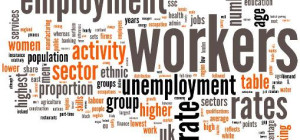Every once in a while, a new innovation comes along that actually changes the way we work. As we become more digitally inclined and new technologies continue to support industries globally, the willingness to quickly adapt the ‘new’ has become more critical than ever. This holds true and assumes relevance for those businesses that are eyeing to become digital leaders and for their employees as well.
At work, we rub shoulders with technology with the core purpose to perform our jobs more proficiently. We collaborate with colleagues who are located on the other side of the globe, many of whom we’ve never met. Thanks to technological advancement, the areas of practice that weren’t possible to digitize until a few years back are rapidly changing. And, the one thing to note here is that it isn’t just the businesses that are transforming, but even the ‘basic nature of work’ is getting modified to a large extent.
It is believed that automation is responsible for altering the in-demand skill sets. As machines started to handle different day-to-day tasks which were previously done by people, the need for the workforce to be consistently reskilled on the recent technologies and practices became key. This is making organizations wonder if they fail to prepare for the ‘change’, it may push them to a corner and hamper their future growth prospects
During the first session of the workforce transformation breakout session at the Dell EMC Forum, Chris Buchanan, Director of Client Solutions at Dell EMC spoke at length on the topic of ‘future-ready workforce’ and stated that a divide exists between Information technology and innovation. He added that a mere 34% of companies are leveraging the full potential of IT and utilizing it as a source of innovation.
In other words, does this mean that the businesses of 2017 should be prompt to embrace change and reassess their business strategies? Are the enterprises of today using the right technology that can support a modern workforce? Also, is your workforce satisfied and happy with the tools and devices they have for the way they work?
These are some of the important questions that come to the fore when the shift towards activity-based work happens where the next gen employees carry out day to day work in a flexible environment across varied devices. In such a scenario, ‘one-size-fits-all’ approach to these rapidly evolving workplaces isn’t the right thing and the onus lies on the enterprises to rethink how employees should collaborate to boost productivity.
According to the IFTF’s Future Work Skills 2020 report, we are expected to see:
- ‘Smarter’ computers and enhanced robotic automation
- Strengthened data collection and analysis for improved decision making
- Enhanced use of more slick and sophisticated communication methods such as graphics, animation, and video
- Greater harnessing of people power via the online platforms
Here are some of the key ‘skills and competencies’ that are needed to make your workforce future-ready.
- Keen to adapt – During uncertain times, adaptability is a critical skill. Although, innovation and the emergence of new technologies positively impact lives, at the same time it causes massive disruption as well. It is likely that automation and robotics will be responsible for changing the scope and shape of jobs. Professionals are required to adapt quickly and also be flexible to implement and try out new things.
For example, when furniture company IKEA some time back decided to use the existing assets and capabilities to experiment with business models, it made a considerable profit. After the enterprise ventured into Russia, it noticed that whenever it opened a new store, the value of nearby real estate grew considerably. This pushed the furniture major to explore two business models at the same time – retailing via its stores and capturing the appreciation in reality values via mall development. Now, the furniture giant is making more profit in Russia from developing and operating malls as compared to its traditional retail business.
- Understand varied disciplines – Is it sufficient to become the best in your industry? No, it never will be. Tomorrow’s workforce should understand and have knowledge of different disciplines. It is key to know things like – What is happening in the industry, what are the forces that are driving these changes, etc. It is important to know how your work impacts the business stakeholders – client, end users, partners etc.
- Able to explore beyond the obvious –Do you believe in challenging the norm? Can you identify the possibilities which others don’t usually see? If your answer to these questions is ‘Yes’, your future is bright.
Steve Jobs, Founder of Apple Inc, proves this point. When huge gigantic mainframe computers was a common thing around the globe, Jobs created a computer that could actually sit on the table top. Many are of the opinion that Jobs could foresee the needs of future as he revolutionized the computing world.
- Entrepreneurial streak – Do you commence a task with the target in mind and take ownership of it until it is completed? Do you prefer to work out of your comfort zone to ensure that the assigned task reaches its logical conclusion?
At first, glance, developing entrepreneurial employees may appear like shooting yourself in the foot, but the advantages of encouraging entrepreneurial individuals outweigh the risks. According to an article published in Harvard Business Review, the ability to identify entrepreneurs allows businesses to efficiently manage their workforce. Entrepreneurship is believed to be a fearless pursuit. It is responsible for pushing the limits of conventional wisdom into unimagined directions.
- Tech savvy – It has been observed that technological advancements are happening at a rapid pace which is transforming lives. Internet of things, mobility, cloud, artificial intelligence, Internet of Things stands at the forefront of this revolution. To succeed, it is important that professionals are open to learning new technologies.
As a result, a lot of businesses have abandoned the conventional learning methods in favor of more effective solutions (mostly involving technological innovation).

Many companies have been found to be empowering their employees (new hires and existing ones) by creating an environment using a learning management system (LMS) where they are able to acquire skills, upgrade knowledge that makes them feel confident, improve performance and strengthen their position in the organization.
- Capable of influencing – The next gen workforce should be able to bring transformational ideas and influence others to buy into their ideas. Apart from having a vision, they should be able to persuade others.
So, do you think that your employees are future-ready? Do they have these mentioned skills or are there any gaps? Please feel free to share your opinion on this.







